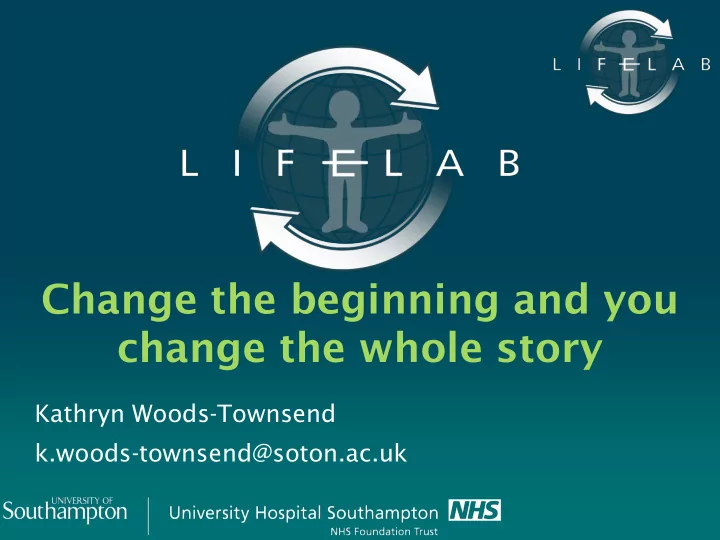

Change the beginning and you change the whole story Kathryn Woods-Townsend k.woods-townsend@soton.ac.uk
Introduction • Behavioural risk factors are the largest contributor to the non-communicable disease burden • Adolescence is a key timepoint to intervene* *Barker et al Lancet 2018
No treatment Adulthood Chronic disease risk Late treatment slight success for vulnerable groups Late treatment Childhood & Earlier treatment adolescence improves future health prospects Mother & infant Early intervention Life course The body is able to respond to lifestyle changes The body is unable to respond to lifestyle changes
#Tripledividend Health now Health in future Health for future children 4
Secondary school programme ‘Me, my health and my children’s health’
Me, My Health & My Children’s Health LifeLab developed as a collaboration by University of Southampton (Education and Medicine) NIHR Nutrition Biomedical Research Centre University Hospital Southampton Maths & Science Learning Centre South East MRC Lifecourse Epidemiology Unit Supported by key stakeholders, particularly local authorities and schools Located at University Hospital Southampton, comprising of a seminar area and a laboratory for hands-on experiments. Programmes are tailored for students of all abilities , initially focusing on 12- 14 year olds
Educational intervention based on research evidence: • Education: Students need to understand the science behind health issues to make informed judgements about their health • Medical: A healthy lifestyle Better health in later life = in early life and for future generations 7
LifeLab aims to provide school students with opportunities to: Learn how they can improve their health and the health of their future children through increased health & science literacy Become enthusiastic about science, and consider further study and careers in scientific disciplines 8
9
LifeLab Research: • 42 schools recruited and randomised to our randomised controlled trials (RCTs) (funded by the BUPA foundation and the British Heart Foundation) • Currently recruiting for new NIHR funded RCT – ‘Engaging Adolescents with Changing Behaviour’ (EACH -B) • To date, over 11,00 school students have attended – Primarily years 8/9, but also 11-18 yrs
A lasting impression Our pilot studies have demonstrated important statistical changes in the attitudes of children 12 months after experiencing LifeLab. 11
I think that the most “If I want to have a important thing I had long healthy life I learnt was that I need to need to be more commit to keeping healthy careful with my body because otherwise when I'm older it can really effect and need to look my health after it more” “I won't eat as many “When I went home and told my “ How unhealthy my unhealthy foods lifestyle actually is and mum about the LifeLab because I don't the small changes programme she suggested that I want to have heart that need to be made start taking my German Shepherd disease.” just to make sure I'm out for a walk every day. So that’s at less off a risk. ” the change I’ve done” 13
Engaging Adolescents in Changing Behaviour (EACH-B) LifeLab behaviour change goals 13-14 year olds, n = 111 + 60 50 40 + No. of times 30 set as goal 20 Programme 10 Grant £2.2m 0 Grace et al, Health Educ 2012 14 Woods Townsend etl, Trials 2016 Rose et al, J Adol Health, 2017
Young Health Champions Level 2 Qualification (GCSE level) Accredited by the Royal Society of Public Health 4 Modules Module 1 - LifeLab module Module 2 - Signpost to Health Improvement Resources Module 3 - Deliver a health improvement message to a group of peers Module 4 - Optional
• Health aspects of science curriculum • Cross-curricular opportunities • Parent engagement
Conclusions LifeLab programme engages adolescents leading to: • sustained changes in health literacy • more critical judgement of their health behaviour Provides a route into schools for public health interventions Future priorities • Repeated exposure (primary, secondary, tertiary • Additional support (Individual, school, family)
More Information: • http://bit.ly/LifeLabSchoolsIntroduction • http://bit.ly/dayatlifelab • http://bit.ly/EarlyLifeLab • http://bit.ly/EACH-B @LifeLabSoton • http://bit.ly/EACH-BGameTrailer @LifeLabSoton @LifeLabSoton www.efolio.soton.ac.uk/blog/lifelab lifelab@soton.ac.uk 023 8120 8979 18
http://www.youtube.com/watch?v=u0qvxsdm-fY 19
Recommend
More recommend